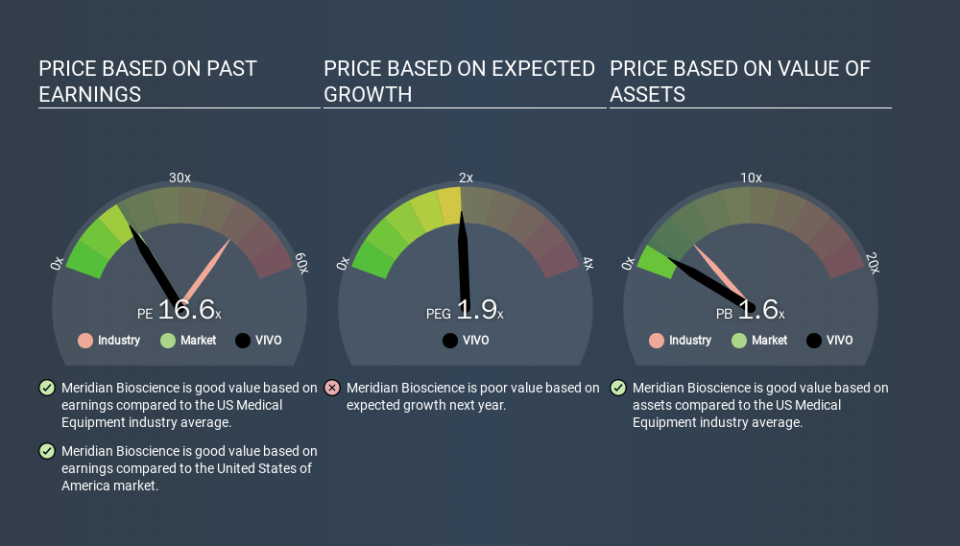How Does Meridian Bioscience's (NASDAQ:VIVO) P/E Compare To Its Industry, After The Share Price Drop?

To the annoyance of some shareholders, Meridian Bioscience (NASDAQ:VIVO) shares are down a considerable 35% in the last month. Indeed the recent decline has arguably caused some bitterness for shareholders who have held through the 56% drop over twelve months.
All else being equal, a share price drop should make a stock more attractive to potential investors. In the long term, share prices tend to follow earnings per share, but in the short term prices bounce around in response to short term factors (which are not always obvious). The implication here is that long term investors have an opportunity when expectations of a company are too low. One way to gauge market expectations of a stock is to look at its Price to Earnings Ratio (PE Ratio). A high P/E implies that investors have high expectations of what a company can achieve compared to a company with a low P/E ratio.
View our latest analysis for Meridian Bioscience
How Does Meridian Bioscience's P/E Ratio Compare To Its Peers?
Meridian Bioscience's P/E of 16.64 indicates relatively low sentiment towards the stock. The image below shows that Meridian Bioscience has a lower P/E than the average (44.9) P/E for companies in the medical equipment industry.
This suggests that market participants think Meridian Bioscience will underperform other companies in its industry. Since the market seems unimpressed with Meridian Bioscience, it's quite possible it could surprise on the upside. You should delve deeper. I like to check if company insiders have been buying or selling.
How Growth Rates Impact P/E Ratios
Companies that shrink earnings per share quickly will rapidly decrease the 'E' in the equation. Therefore, even if you pay a low multiple of earnings now, that multiple will become higher in the future. A higher P/E should indicate the stock is expensive relative to others -- and that may encourage shareholders to sell.
Meridian Bioscience saw earnings per share decrease by 26% last year. And it has shrunk its earnings per share by 12% per year over the last five years. This might lead to muted expectations.
Don't Forget: The P/E Does Not Account For Debt or Bank Deposits
One drawback of using a P/E ratio is that it considers market capitalization, but not the balance sheet. So it won't reflect the advantage of cash, or disadvantage of debt. Theoretically, a business can improve its earnings (and produce a lower P/E in the future) by investing in growth. That means taking on debt (or spending its cash).
Spending on growth might be good or bad a few years later, but the point is that the P/E ratio does not account for the option (or lack thereof).
Is Debt Impacting Meridian Bioscience's P/E?
Meridian Bioscience's net debt is 2.2% of its market cap. So it doesn't have as many options as it would with net cash, but its debt would not have much of an impact on its P/E ratio.
The Verdict On Meridian Bioscience's P/E Ratio
Meridian Bioscience's P/E is 16.6 which is about average (17.2) in the US market. Given it has some debt, but didn't grow last year, the P/E indicates the market is expecting higher profits ahead for the business. Given Meridian Bioscience's P/E ratio has declined from 25.7 to 16.6 in the last month, we know for sure that the market is significantly less confident about the business today, than it was back then. For those who prefer to invest with the flow of momentum, that might be a bad sign, but for a contrarian, it may signal opportunity.
Investors should be looking to buy stocks that the market is wrong about. If it is underestimating a company, investors can make money by buying and holding the shares until the market corrects itself. So this free report on the analyst consensus forecasts could help you make a master move on this stock.
You might be able to find a better buy than Meridian Bioscience. If you want a selection of possible winners, check out this free list of interesting companies that trade on a P/E below 20 (but have proven they can grow earnings).
If you spot an error that warrants correction, please contact the editor at editorial-team@simplywallst.com. This article by Simply Wall St is general in nature. It does not constitute a recommendation to buy or sell any stock, and does not take account of your objectives, or your financial situation. Simply Wall St has no position in the stocks mentioned.
We aim to bring you long-term focused research analysis driven by fundamental data. Note that our analysis may not factor in the latest price-sensitive company announcements or qualitative material. Thank you for reading.

 Yahoo News
Yahoo News 

